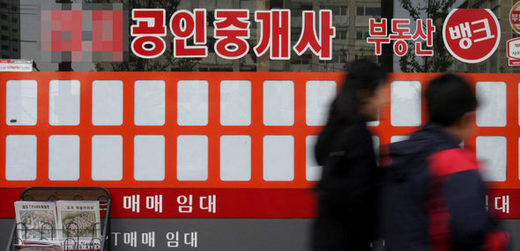 |
|
House price postings stand strangely blank in the window of a real estate brokerage. The government recently requested brokers to leave prices off their advertising boards, thinking that posting them could stimulate a jump in apartment prices.
|
Researchers warn of real estate obsession's detrimental effects
South Korea's economy, already saddled with an economic slowdown, has been hit by a recent surge in home prices. Stubbornly weak private consumption is not seen as recovering anytime soon, as low-income earners are struggling with higher interest payments on their mortgage loans. In contrast, financial and human capital are converging in the property-related industry, with the number of real estate brokerages rapidly increasing and university enrollments for real estate departments growing. Experts say such a 'distortion' may prompt the economy's potential growth to weaken. Businesses losing; property investment better A 40-year-old businessman, who operates a sock-making factory in Gyeonggi Province, said his business is in the red, and his last bet is his plant's property value, which is currently skyrocketing. In the late 1990s, he had seen profit by exporting socks to China, but the business was hit by a flood of Chinese-made counterfeit socks in recent years. But the price of the land he purchased for his plant site in February last year rose to 700,000-800,000 won (US$721-824) per pyeong from 500,000 won (one pyeong is 3.3 square meter). "Previously, I had thought about making money via business, but after that idea didn't pan out, I purchased the plant site with loans." As he saw how property prices are surging these days, he regretted not buying more land and apartments. Rising land prices make owners of small and medium-sized businesses face greater difficulty. A person who is consulting people who want to set up small companies said, "An affordable price range for ordinary small manufacturers is 300,000-400,000 won per pyeong, but the price in Seoul is as low as 3 million won and the price in Seoul's neighboring areas is more than 1 million won." In the 1990s, the rate of land price increase nationwide was nearly zero, but the rate was 1.31 percent in 2001, 8.98 percent in 2002, 3.43 percent in 2003, 3.86 percent in 2004, 4.99 percent in 2005 and 4.05 percent in 2006.
 |
|
A street packed with real estate brokerage offices.
|
Meanwhile, the real estate industry is booming. According to the Korea Public Real Estate Brokerage Association, the number of real estate brokerage offices nationwide rose by 8,256 from 1997 for five years. But the number jumped by 28,031 in the next five years. At a commercial building in the Eunma apartment complex in Seoul's affluent Gangnam district, 35 brokerage offices alone are housed. Universities, lawyers, and banks are jumping onto the real estate bandwagon. Currently, about 50 universities nationwide have a real estate-related department. One in eight graduate students at Konkuk University was a member of its real estate program. Park Sang-eon, president of real estate consultant group U&R, said that real estate departments are becoming one of the most popular academic departments. A lawyer for a builder said, "Recently, the number of law firms and lawyers specializing in real estate matters is rising." No consumption, no saving With home prices rising for more than five years, household burdens continue to mount when it comes to interest payments on mortgage loans. Currently, the amount of money on the stock market is shrinking. According to Kookmin Bank, the monthly balance of funds, or investments made by bank customers, was 379.6 billion won in June, 483.8 billion won in July, 248.4 billion won in August, 191.6 billion won in September, 208.9 billion won in October and 18.8 billion won as of November 15. Samsung Securities researcher Oh Hyeon-seok said, "Though trade increased due to a rise in the stock market index, the fall in the monthly balance of funds was partly due to higher interest burdens amid the surging home prices." This year's quarter-on-quarter growth rate of private consumption has fallen to 0.5 percent in the third quarter, from 0.9 percent in the second quarter and 1.3 percent in the first quarter. Korea Economic Research Institute researcher Heo Chan-kuk said, "A surge in home prices can reduce disposable income for individuals. Although private consumption had rebounded since late last year, the surging home prices dashed its hopes of recovery." Concerns over weakening growth potential Kang Kyeong-hun, a researcher at the Korea Financial Research Institute, said that the recent surge in housing prices "will have a negative impact on the economy, as people and money are converging into the real estate industry, one that has little relation to growth potential or value creation." Oh Keon-ho, an official at the Democratic Labor Party, said the phenomenon may weaken consumer sentiment held by those who do not have their own homes, and may prompt companies to invest less. "Production and consumption are not that valuable for those holding real estate assets." Please direct questions or comments to [englishhani@hani.co.kr]






